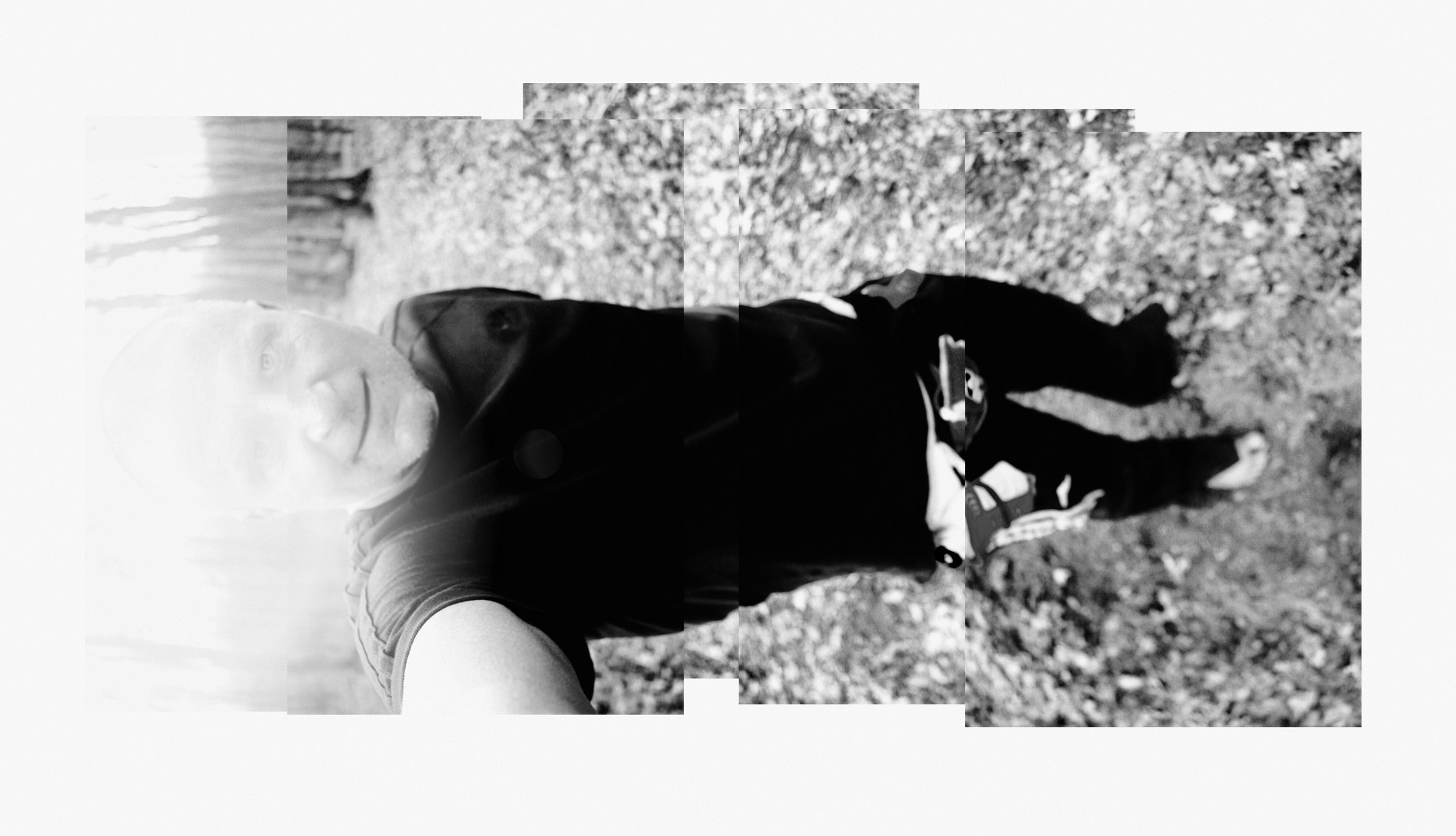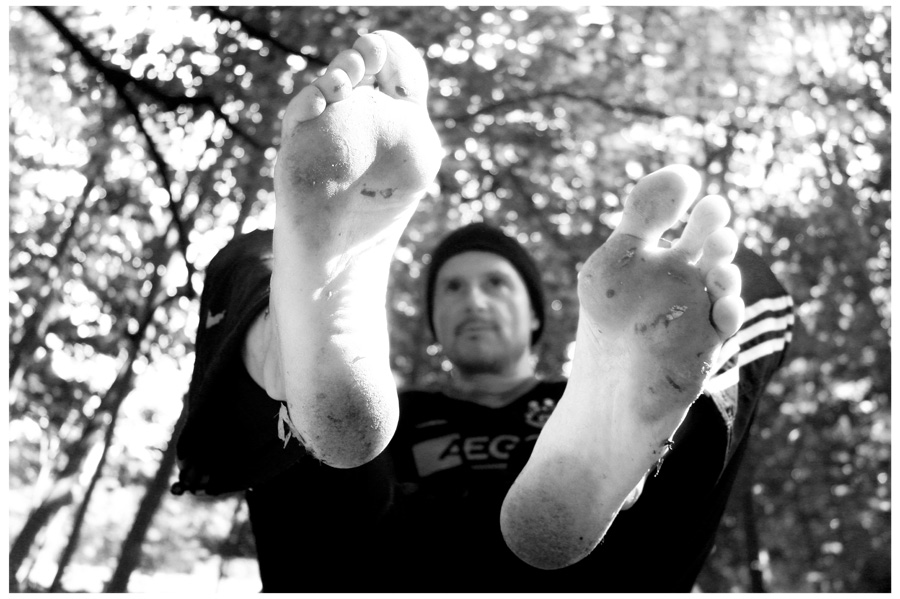The way of the blood
- Details
- Hits: 4207

Haarlem, today. Flow [ focus ]
Above: Four days after surgery (EVLT: Endovenous laser treatment) there already is improvement in the treated varicose vains-condion (compared too what, you may ask? True, nothing to compare it with, you will not find one post-training-picture -- PGIA -- without long-trousers on this website -- too anxious to show that, I was). Though, under the knee and above the ankle varicose veins are still visible -- it can take up to 6 months to finally disappear -- 4 days after surgery there already is -- apart from the tension/pain relief -- also visual improvement. Visible is the vain in the upper part of the leg (on the shadow-line). Initially a thick, snake-like tube, laying like the root of a three sometimes surfaces trough a road cracking the asphalt, appearing from underneath the skin -- now looking more like a scar. Right beneath the knee brushes have shown up, caused by the operation. Both the 'doable' experience of the operation itself and the results, make the treatment (EVLT) -- when 'suffering' from the disadvantages of varicose veins and the potential risks that come with them -- a highly recommended undertaking. Despite -- or even better: just because -- all the horror stories people will find when searching the internet (it seems the whiners have a monopoly on populating all the -- medical -- fora, complaining about just anything). Love, trust and make friendship. Overcome anxiety, go where the fear is, learn to feel at ease. (topic to be continued)
Min/max temperature: 9°C/18°C; humidity: 64%; precipitation: 0 mm; sea level pressure: 1020.88 hPa; wind: North 9 km/h; visibility: 10.0 kilometres; Clouds: Few 914 m .; Moon: Waning Gibbous, 89% visible
During the operation I enjoyed a pleasant conversation with both the surgeon and the well-educated nurse. I asked the surgeon whether he was -- and if so -- where his fascination for vascular surgery came from:
"Yes. If you know the way of the blood, you know where to find everything inside the human body."
Dr. A. Rijbroek, surgeon, personal communication during EVL treatment in Haarlem, 10 May 2017
"The meaning of emptiness is space where there is nothing, and I also envisage emptiness as that which cannot be known. Emptiness, of course, is where there is nothing. Knowing that which does not exist while knowing that which exists -- that is emptiness… He should know that true empty space is there where the clouds of uncertainty have completely dissipated… Think of the void as the way and see the way as the void. In emptiness the good exists and evil does not exist. Knowing exists, the principle exists, the way exists, and the mind -- is void.
Miyamoto Musashi in Kenji Tokitsu's 'Miyamoto Musashi. His Life and Writing', page 328, first published in 2000 by Editions Desiris in France
Winter_and_spring
- Details
- Hits: 4169

Velsen/Bloemendaal, 6 Februari 2013. Part of dune-beach training trail. Near Duin en Kruidberg in Velsen.

Above: Kennemerduinen, 6 Februari 2013. Pictures taken during training on trail in Stormschool Bloemendaal area, near Duin en Kruidberg.
Simplicity
- Details
- Hits: 4116

Kennemer Dunes, today. "I always go forward with it" [ "To make clear what specific goals to achieve" ]
Min/max temperature: 3°C/10°C; humidity: 87%; precipitation: 0 mm; sea level pressure: 1013.09 hPa; wind WNW 9.7 km/h; visibility: 11.0 kilometres.
"When I am writing it is about the page. It is not about the movie. It is not about cinema. It is about literature, about me putting the pen to paper and writing a good page. And making it work completely as a literature document in itself. That is my first artistic contribution. And if I do my job right, by the end of the script, I should be having the thought, 'You know, if I were to just publish this now and not make it, I am done. I've done it. I could actually be okay, with just saying that's it. And whoever wants to read it, will read it, and I am done.' Now it is mine to F-up if, I go forward with it. Now, I always go forward with it, but I actually think, where I come from, I wanna love that script so much, I am tempted to stop. I am tempted to call myself a winner right then and there, before I climb the mountain. […] There is stuff in that script that will never ever make that movie, but it just makes the book, the piece of literature better. It is a better read, it is a better… more emotionally satisfying… Just like you are doing an adaptation, you peal a lot of that stuff away."
Quentin Tarentino in 'The Directors: Full Uncensored Interview', first published on 27 November 2012 by The Hollywood Reporter
"The lightfoot summer comes nigh us,
The branching trees and the bright unmindful grass
Do not forget their time,
They take no thought, yet remember
To show forth their colour in season."
From 'Kakitsubata' a Noh play by Motokiyo (b. 1374, d. 1455), published in Ezra Pound and Ernest Deollosa's 'The Classic Noh Theatre of Japan', page 123, first published in 1917 by Alfred A. Knopf, Inc. USA
A [ leader ] can stimulate his [ people ] by seeing them, by talking to them. The old saying "management by walking around" is still valid. It is even more valid in the e-mail era that we are living at the moment. There is a risk, especially within staffs, that massages are sent without talking to or seeing each other anymore. Talking to the [ people ] is extremely important, especially when times are bad, people are tired and are under a lot of pressure. Frequent contact […] is then much needed. […] The [ leader ] should make clear what specific goals he wants to achieve. He should show […] that he has both high expectations and confidence [ He ] must also determine in what direction he wants to go with his unit. He must develop a vision. The next step is to make the whole unit enthusiastic about his vision. They must believe in his ideas. [ One ] can only do so by walking around, by talking to people, listening and discussing your ideas and theirs […] I had to praise and encourage [ them ], reassuring and reminding them of our commitment to the mission. Commitment is a necessary ingredient for that extra push sometimes needed to accomplish a dangerous and stressful mission."
P.C. Cammaert, in 'NL Arms', page 35, 36, first published in 1997 by RNMA, Breda
"Give up sainthood, renounce wisdom,
And it will be a hundred times better for everyone.
Give up kindness, renounce morality,
And people will rediscover filial piety and love.
Give up ingenuity, renounce profit,
And bandits and thieves will disappear.
These three are outward forms alone: They are not sufficient in themselves.
Its is more important
To see the simplicity,
To realise our true nature,
To cast off selfishness
And temper desire."
Lao Tsu in 'Tao Te Ching', page 21, translated by Gia-fu Feng and Jane English. Originaly published by Knopf, New York, 1972
SAR_2_along_the_way
- Details
- Hits: 4158

Above: Footprint after Saturday's 32K SAR
"The effect of the successful adventure [...] is the unlocking and release again of the flow of life into the body of the world." - Joseph Campbell, in THWATF (page 40, 'The World Navel')
Smart training is entertaining
- Details
- Hits: 4064

Kennemer dunes 360° today. Share [ radiate ]
Min/max temperature: 6°C/9°C; humidity: 100%; precipitation: 2 mm; sea level pressure: 1002 hPa; wind: WNW 43.0 km/h; visibility: 10.0 kilometres; Clouds: Few 304 m., Scattered Clouds 365 m., Mostly Cloudy 457 m
"'Cest le ton qui fait la musique.' A statement's tone and style decide about its meaning."
Quoted and translated from French by Martin M. Winkler in 'Arminius the Liberator: Myth and Ideology', page 250, first published in 2016 by Oxford University Press, New York
" I love my own time too much and would not have chosen to live in any other even if that had been possible. Yet, if forced to an alternative I would choose to be the first European in Africa free to see, before we laid our blind, violent hands upon it, the vast land glowing from end to end in the blue of its Madonna days like some fabulous art gallery with newly restored and freshly painted Bushman canvases of smooth stone and honey-coloured rock. […] Already [ between the years 1800 and 1860 ] the Bushman's extensive hold on Africa had shrunk to the country along the Great River, the southern and central water-pints of what was to become the Orange Free State, and some of the steeper and deeper gorges of the Dragon ranges and their splintered spurs. He was still fighting back in tiny little pockets all over the veld but only in these areas did he retain some semblance of his former cohesion with his own kind and the other natural children of Africa. But about the year 1800 all that quickly changed. In that period pressure from the south reached greatest force; in the north, its starkest brutality. A long process of demoralisation of the spirit of the indigenous peoples of Africa was fast approaching its climax. Already, for centuries, human society in Africa had been society on the run. But in this period the whirlwind welter of migratory hordes having their violent way with weaker peoples, as well as the systematic raiding, year in and year out, deep into the heart of the continent by the pitiless slave trader from Zanzibar armed with powder and shot, produced a convulsion and disruption of human life and spirit on a scale not seen before. Terror, destruction, and disintegration, like the smell of the dead rotting on an apocalyptic battle field, stood high in the shining air. Almost every tribe of Africa picked up only what was negative in the situation. The weak lost the courage and wit that alone might have saved them and were ruled by blind terror. But they, too, whenever forced to flee into the country of someone even weaker than themselves, practised with all the ruthlessness of the convert the terror which had hitherto flayed them. The strong thought of little more than plundering and preying on the weak and making themselves even stronger. Then they feel out among themselves, setting up rival combinations for loot and destruction."
Laurens van der Post in 'The lost world of the Kalahari', page 30, 49, first published in 1958 by The Hogarth Press in Great Brittain
"The Tao of heaven is like bending a bow.
The high is lowered and the low is raised.
If the string is too long, it is shortened.
If there is not enough, it is made longer.
The Tao of heaven is to take from those who have too much and give to those who do not have enough.
Ordinary people act differently.
They take from those who do not have enough and give to those who already have too much.
Who has more than enough and gives it to the world?
Only the wise.
Therefore the wise work without recognition.
They achieve what has to be done without dwelling on it.
They do not try to show their knowledge."
Lao Tsu in 'Tao Te Ching', page 80, translated by Gia-fu Feng and Jane English. Originaly published by Knopf, New York, 1972


